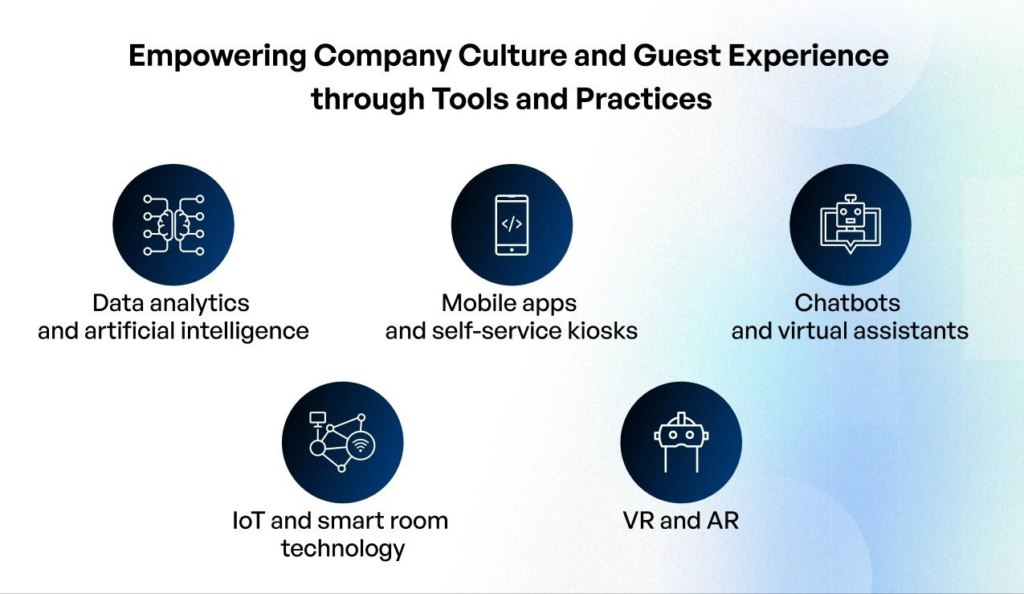The hospitality industry is undergoing a significant transformation driven by the integration of advanced technologies aimed at enhancing guest experiences and operational efficiency.

This shift towards tech-savvy operations is particularly evident in the growing adoption of contactless experiences, self-service options, automated billing, and integrated hotel apps.
These technological advancements are designed to improve safety, convenience, and overall guest satisfaction, meeting the evolving expectations of modern travelers.
Contactless Experiences

The COVID-19 pandemic has accelerated the adoption of contactless technologies in the hospitality sector. To minimize physical interactions and enhance safety, hotels are increasingly implementing contactless check-in and check-out processes.
Guests can now use their smartphones to check in, access their rooms, and settle their bills, significantly reducing the need for face-to-face interactions with hotel staff.
For instance, the Zoku Hotel in Amsterdam offers a fully contactless experience, including self-service check-in and check-out, and automated billing via email (Xotels).
This not only enhances safety by reducing physical touchpoints but also streamlines the arrival and departure process, providing a smoother and more efficient guest experience.
Self-Service Check-In and Check-Out

Self-service kiosks and mobile check-in options are becoming standard features in many hotels. These systems allow guests to bypass the front desk, thus reducing wait times and enhancing convenience.
By using mobile apps or kiosks, guests can select their rooms, access hotel services, and check out at their convenience, providing a greater sense of control over their stay.

For example, Marriott International has introduced mobile check-in and mobile key features across many of its properties. Guests can use the Marriott Bonvoy app to check in and receive a digital room key on their smartphones, enabling them to go directly to their rooms upon arrival.
This technology not only improves the guest experience but also allows hotels to allocate staff resources more effectively (Travel Market Report).
Automated Billing

Automated billing systems are another significant technological advancement in the hotel industry. These systems ensure that guests receive accurate and timely bills, reducing the likelihood of billing errors and enhancing transparency.
Automated billing also facilitates faster check-outs, as guests can review and settle their accounts through mobile apps or self-service kiosks without waiting in line at the front desk.
Hilton Worldwide has been at the forefront of adopting automated billing technologies. By integrating these systems with their Hilton Honors app, guests can receive digital invoices, review charges in real-time, and make payments directly through the app. This seamless billing process enhances guest satisfaction and operational efficiency (Stories From Hilton).
Integrated Hotel Apps
Integrated hotel apps are becoming essential tools for enhancing guest experiences. These apps provide a centralized platform for accessing various hotel services, such as room service, spa reservations, and concierge assistance.

Additionally, they offer features like mobile keys, digital check-in, and personalized recommendations, making it easier for guests to customize their stay.
One notable example is the Four Seasons Hotels and Resorts app, which allows guests to interact with the hotel in multiple languages, request services, and receive personalized recommendations based on their preferences.
The app also features a chat function, enabling guests to communicate directly with hotel staff for any inquiries or special requests (Xotels).
Enhancing Safety and Convenience
The integration of advanced technologies in hotels significantly enhances both safety and convenience for guests. Contactless experiences and automated processes reduce physical interactions and the potential for virus transmission, addressing health and safety concerns heightened by the pandemic.

Moreover, these technologies streamline operations, reducing wait times and allowing guests to enjoy a more seamless and efficient stay.
According to a report by Xotels, the implementation of smart technologies, such as mobile check-in and contactless payment systems, not only meets the growing demand for safety and convenience but also improves overall guest satisfaction.
Hotels that successfully integrate these technologies can differentiate themselves in a competitive market, attracting tech-savvy travelers who prioritize efficiency and personalized experiences (Xotels).
Future Prospects
As technology continues to evolve, the potential for further innovations in the hospitality industry is immense. Future advancements may include the use of artificial intelligence (AI) and machine learning to predict guest preferences and personalize services, virtual reality (VR) tours for booking decisions, and advanced data analytics to optimize hotel operations and enhance the guest experience.

For instance, some hotels are exploring the use of AI-powered chatbots to provide 24/7 customer service, offering instant responses to guest inquiries and assisting with reservations.
Similarly, VR technology can allow potential guests to take virtual tours of hotel rooms and amenities before making a booking, providing a more immersive and informed decision-making process (Stories From Hilton).
Conclusion
The integration of advanced technologies in the hotel industry is transforming the way hotels operate and interact with guests. By adopting contactless experiences, self-service options, automated billing, and integrated hotel apps, hotels can enhance safety, convenience, and overall guest satisfaction. As these technologies continue to evolve, they will play an increasingly critical role in shaping the future of hospitality, meeting the demands of modern travelers and setting new standards for service excellence.
